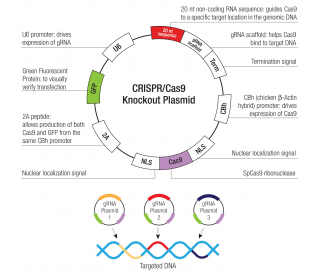Purity
>90%, by SDS-PAGE under reducing conditions and visualized by silver stain.
Endotoxin Level
<0.10 EU per 1 μg of the protein by the LAL method.
Activity
Measured by its ability to inhibit rmGDF-8 activity in K562 human chronic myelogenous leukemia cells. Thies, R.S. et al. (2001) Growth Factors 18:251. The ED 50 for this effect is 0.05-0.25 µg/mL in the presence of 5 ng/mL of Recombinant Mouse GDF‑8/Myostatin. Approximately 1 µg/mL will completely inhibit GDF-8 activity in these cells.
Source
Mouse myeloma cell line, NS0-derived Asn25-Ser265, with a C-terminal 10-His tag
Accession #
N-terminal Sequence
AnalysisAsn25
Predicted Molecular Mass
28.7 kDa
SDS-PAGE
39 kDa, reducing conditions
Carrier Free
What does CF mean?
CF stands for Carrier Free (CF). We typically add Bovine Serum Albumin (BSA) as a carrier protein to our recombinant proteins. Adding a carrier protein enhances protein stability, increases shelf-life, and allows the recombinant protein to be stored at a more dilute concentration. The carrier free version does not contain BSA.
What formulation is right for me?
In general, we advise purchasing the recombinant protein with BSA for use in cell or tissue culture, or as an ELISA standard. In contrast, the carrier free protein is recommended for applications, in which the presence of BSA could interfere.
1539-PG/CF |
| 1539-PG |
Formulation Lyophilized from a 0.2 μm filtered solution in PBS. | Formulation Lyophilized from a 0.2 μm filtered solution in PBS with BSA as a carrier protein. | |
Reconstitution Reconstitute at 100 μg/mL in sterile PBS. | Reconstitution Reconstitute at 50 μg/mL in sterile PBS containing at least 0.1% human or bovine serum albumin. | |
Shipping The product is shipped at ambient temperature. Upon receipt, store it immediately at the temperature recommended below. | Shipping The product is shipped at ambient temperature. Upon receipt, store it immediately at the temperature recommended below. | |
Stability & Storage: Use a manual defrost freezer and avoid repeated freeze-thaw cycles.
| Stability & Storage: Use a manual defrost freezer and avoid repeated freeze-thaw cycles.
|
Background: GDF-8/Myostatin
Growth Differentiation Factor 8 (GDF-8), also known as Myostatin, is a secreted TGF-beta superfamily protein that is expressed specifically in developing and adult skeletal muscle. It controls myoblast proliferation and is a potent negative regulator of skeletal muscle mass (1-3). Mouse GDF-8 is synthesized as a 376 amino acid (aa) preproprotein that consists of a 24 aa signal peptide, a 243 aa propeptide, and a 109 aa mature protein (2). Within the propeptide, mouse GDF-8 shares 96% and 99% aa sequence identity with human and rat GDF‑8, respectively. GDF-8 is secreted as a preproprotein that is cleaved by BMP-1 family proteases to separate the 35‑40 kDa propeptide from the 12 kDa bioactive mature protein (4‑6). This results in a latent complex containing a disulfide-linked dimer of the mature protein and two noncovalently-associated molecules of the propeptide (2, 6). The GDF‑8 propeptide functions as an inhibitor of mature GDF‑8, and GDF-8 activity can also be inhibited through association with Follistatin, FLRG, Decorin, or GASP-1 (6‑11). The uncleaved GDF-8 proprotein binds Latent TGF-beta bp3 which can sequester it in the extracellular matrix and prevent the proteolytic cleavage of the propeptide (12). GDF-8 binds to the type II Activin receptor Activin RIIB which then associates with the type I receptors Activin RIB/ALK‑4 or TGF-beta RI/ALK-5 to induce signaling (13). GDF-8 additionally inhibits adipogenic differentiation of mesenchymal stem cells and preadipocytes (14). Genetic deletion of GDF-8 or in vivo administration of the GDF-8 propeptide induces muscle hypertrophy as well as enhanced glucose utilization and insulin sensitivity and a reduction in overall fat mass (15, 16).
References:
McPherron, A.C. (2010) Immunol. Endocr. Metab. Agents Med. Chem. 10:217.
McPherron, A.C. et al. (1997) Nature 387:83.
Zimmers, T.A. et al. (2002) Science 296:1486.
Wolfman, N.M. et al. (2003) Proc. Natl. Acad. Sci. 100:15842.
McFarlane, C. et al. (2005) Dev. Biol. 283:58.
Lee, S.J. et al. (2001) Proc. Natl. Acad. Sci. 98:9306.
Thies, R.S. et al. (2001) Growth Factors 18:251.
Amthor, H. et al. (2004) Dev. Biol. 270:19.
Hill, J.J. et al. (2002) J. Biol. Chem. 277:40735.
Miura, T. et al. (2006) Biochem. Biophys. Res. Commun. 340:675.
Hill, J.J. et al. (2003) Molecular Endocrinology 17:1144.
Anderson, S.B. et al. (2008) J. Biol. Chem. 283:7027.
Rebbapragada, A. et al. (2003) Mol. Cell. Biol. 23:7230.
Guo, W. et al. (2008) J. Biol. Chem. 283:9136.
Matsakas, A. et al. (2009) Neuromuscul. Disord. 19:489.
Guo, T. et al. (2009) PloS ONE 4:e4937.
Long Name:
Growth Differentiation Factor 8
Entrez Gene IDs:
2660 (Human); 17700 (Mouse)
Alternate Names:
GDF8; GDF-8; GDF8growth differentiation factor 8; growth/differentiation factor 8; MSTN; Myostatin










